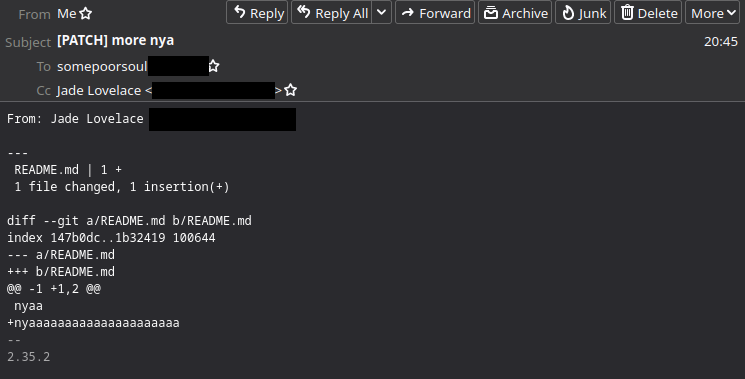Oh no, git send-email
Say you have to contribute to some project run by Unix bros who want the 90s back, so they don't use GitHub or its many self-hosted alternatives to accept pull requests, and you need to email them a patch. I would find it entirely understandable to want to get a quill pen and write a letter on paper for fun instead of dealing with mailing lists and emailing a patch.
Unfortunately, sometimes one needs to engage in the much less pleasant form of anachronism of contributing to this kind of software anyway, as mailing lists with patches are still very common in the land of older system software under the C. The patch-emailing features of git are some of its most infamous for poor usability, which is saying something, because git as a whole is known for being hard to use.
For those who are unfamiliar with the email-patch infrastructure, git is
extremely picky about emails being the exact format it likes and not getting
modified at all by the client. This means that in practice, you need to send
your patch emails using git send-email as your email client.
Theoretically, https://git-send-email.io/ (by someone who made their own new
git source hosting service that mysteriously uses emails to submit patches)
will tell you how to set it up. Well, except if git send-email has other
ideas: it would not send through my email provider for reasons that must have
been a bug: I seem to recall it was something to do with either a TLS or SMTP
implementation being broken.
I ended up needing to use a separate Mail Transfer Agent (SMTP-speak for
"SMTP client") and plumb it into git. For this, I used msmtp.
First, store your SMTP email password in the system keyring:
# on KDE
$ kwallet-query -w user@example.com kdewallet -f mail
# on GNOME/other things supporting freedesktop secrets
$ secret-tool store --label=msmtp host smtp.migadu.com service smtp user myuser@example.com
# on macOS
$ security add-internet-password -s smtp.migadu.com -r smtp -a myuser@example.com -w
I use KDE, so this setup uses the KDE wallet to store the password. If you use
macOS, GNOME or the future version of KDE that supports the freedesktop secrets
system, remove the passwordeval line from the sample config here as
msmtp can get the password from your keyring by itself.
Then write a msmtp configuration file:
~/.msmtprc
# Used to identify which account you are using in the msmtp command line
account myaccountname
# Tunneled-TLS email configuration. Probably correct for most modern servers,
# but check your email provider documentation. This is correct for migadu.
host smtp.migadu.com
port 465
tls on
tls_starttls off
auth on
user user@example.com
# From address on the envelope. Probably your email, but not necessarily
# (note that this is distinct from the "from" address in the message body that
# will be shown to recipients. it needs to match the address subscribed to the
# mailing list)
from listsubscriber@example.com
# Use kwallet-query to get the password because kwallet does not support the
# freedesktop secrets protocol
# NOTE!! If you are on macOS or GNOME or the future version of KDE that
# supports freedesktop secrets, delete the following line!
passwordeval kwallet-query -r user@example.com kdewallet -f mail
Then configure git (I keep this in ~/.gitconfig as I don't really want to
check it in for spam reasons, whereas most of my git config is checked in and
stored at ~/.config/git/config):
~/.gitconfig
[sendemail]
sendmailcmd = /usr/bin/msmtp
smtpserveroption = -a
smtpserveroption = myaccountname
confirm = always
# don't send yourself emails
suppresscc = self
Finally, you can send an email:
/tmp/nya » git init
Initialized empty Git repository in /tmp/nya/.git/
/tmp/nya - [main] » echo nyaa > README.md
/tmp/nya - [main●] » git add -A
/tmp/nya - [main●] » git commit -m 'initial commit'
[main (root-commit) 5e2e44d] initial commit
1 file changed, 1 insertion(+)
create mode 100644 README.md
/tmp/nya - [main] » echo nyaaaaaaaaaaaaaaaaaaaaa >> README.md
/tmp/nya - [main●] » git commit -am 'more nya'
[main 3df1f2d] more nya
1 file changed, 1 insertion(+)
# NOTE: you probably want to use --compose to write a message to include with
# your patch. You can also use --dry-run to do a dry run.
/tmp/nya - [main] » git send-email --to='somepoorsoul@example.com' --from=message-from@example.com HEAD^
/tmp/jade/jKCO7nnORw/0001-more-nya.patch
(mbox) Adding cc: Jade Lovelace <commitauthor@example.com> from line 'From: Jade Lovelace <commitauthor@example.com>'
From: message-from@example.com
To: somepoorsoul@example.com
Cc: Jade Lovelace <commitauthor@example.com>
Subject: [PATCH] more nya
Date: Fri, 22 Apr 2022 20:45:30 -0700
Message-Id: <20220423034529.3057172-1-message-from@example.com>
X-Mailer: git-send-email 2.35.2
MIME-Version: 1.0
Content-Transfer-Encoding: 8bit
Send this email? ([y]es|[n]o|[e]dit|[q]uit|[a]ll): y
OK. Log says:
Sendmail: /usr/bin/msmtp -a message-from@example.com -i somepoorsoul@example.com commitauthor@example.com
From: message-from@example.com
To: somepoorsoul@example.com
Cc: Jade Lovelace <commitauthor@example.com>
Subject: [PATCH] more nya
Date: Fri, 22 Apr 2022 20:45:30 -0700
Message-Id: <20220423034529.3057172-1-message-from@example.com>
X-Mailer: git-send-email 2.35.2
MIME-Version: 1.0
Content-Transfer-Encoding: 8bit
Result: OK
And, yes, it was received:
See? That was sooooo easy very hard for no reason.
